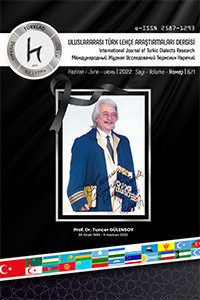REŞAT NURİ GÜNTEKİN’İN ‘YAPRAK DÖKÜMÜ’ ROMANINDA MUHAFAZAKÂRLIK VE MODERNİZM ÇATIŞMASI
Siyasi, ekonomik ve askerî alanlarda Batılı devletlerle sık sık karşı karşıya gelen ve 17. yüzyıldan itibaren gerileme sürecine giren Osmanlı Devleti yöneticilerinin, aydınlarının ve halkının zihniyet dünyasında ve yaşayış tarzlarında görülen Avrupai etkilerin izleri, zaman içinde koyuluğu artarak gittikçe belirgin hâle gelir. Bu izlerin tasvir edildiği alanlardan birisi de edebiyattır. Tanzimat’tan itibaren, edebiyatçılarımız, modern hayat tarzı ve değerleriyle alakalı duruş ve görüşlerini yansıttıkları eserler vermiştir. Bu temayül, Cumhuriyet Döneminde de görülür. Bunlardan birisi de “Yaprak Dökümü” romanının yazarı Reşat Nuri’dir. "Yaprak Dökümü"nde Reşat Nuri Güntekin, Tanzimat’tan itibaren romancılarımızın sıkça kullandıkları yanlış Batılılaşma temasını ele almıştır. Yazar, bu romanında Batılılaşmanın yanlış biçimde algılanması ve yaşanması olgusunu, Ali Rıza Bey ailesi ve bu ailenin sosyal çevresinde göstermeyi denemiş ve bu çabası, kendisine Yaprak Dökümü adlı sosyal içerikli romanını sağlamıştır. Merkezinde Ali Rıza Bey ailesi bulunan romanda, yazar, Cumhuriyet devrinin ilk yıllarındaki sosyal ve ekonomik kaos ortamında, toplumun, geleneksel değerleri terk ederek maddeci -paraya dayalı- bir dünya görüşünü esas alan yeni bir hayat tarzını, ahlak anlayışını benimsemesi konusu üzerinde durur. Olay örgüsünün sonunda, romanın trajik kahramanı Ali Rıza Bey, “yeni düzene” teslim olur. Romanda, kahramanın ve çevresindeki ailesinin yaşadığı deneyim, Cumhuriyet döneminde orta sınıf ailelerin karşı karşıya kaldığı geleneksel ve modern hayat tarzlarının çatışmasını ve çoğunlukla ‘yeni’nin galip gelişini temsil eder.
Anahtar Kelimeler:
Muhafazakârlık, Modernizm, Batılılaşma, Karakter, Tip
THE CLASH OF CONSERVATISM AND MODERNISM IN THE NOVEL “FALL OF THE LEAVES” BY REŞAT NURİ GÜNTEKİN
The traces of the European influences seen in the mentality world and the way of living of the Ottoman Empire rulers, intellectuals and people, who frequently confronted the Western states in the political, economic and military fields and entered into a decline from the 17th century onwards, will become increasingly clear over time. One of the areas in which these traces are depicted is literature. Since the Tanzimat period, our writers have produced works in which they reflect their stance and views related to modern lifestyle and values. This tendency is also seen in the Republican Period. One of them is Reşat Nuri, the author of the novel “Yaprak Dökümü”. In Leaf Dump, Reşat Nuri Güntekin has dealt with the theme of false Westernization which is often used by our novelists since the Tanzimat period. In this novel, the author tried to show the phenomenon of the misperception and experience of Westernization in the Ali Rıza Bey family and the social environment of his family. This effort provided the author with a social content novel called Yaprak Dökümü. In this novel with the Ali Rıza Bey family at its center, the author focuses on the adoption of a new lifestyle and moral understanding based on a materialist-money-based worldview by abandoning traditional values in an environment of social and economic chaos in the early years of the Republican era. At the end of the plot, the tragic hero of the novel, Ali Rıza Bey, surrenders to the “new order. In the novel, the experience of Ali Rıza Bey and the family around him represents the clash of traditional and modern lifestyles faced by middle-class families during the Republican era, and often represents the victorious arrival of the “new”.
Keywords:
Conservatism, Modernism, Westernisation, Character, Type,
___
- KUDRET, C. (1987). Türk Edebiyatında Hikâye ve Roman. İstanbul.
- NACİ, F. (1990). Türkiye’de Roman ve Toplumsal Değişme. İstanbul.
- CUDDON , J. A. (1986). Literary Terms. USA. EMİL, Birol. (1984). Reşat Nuri Güntekin’in Romanlarında Şahıslar Dünyası, İstanbul.
- Başlangıç: 2017
- Yayıncı: Ahmet BURAN
Sayıdaki Diğer Makaleler
TARİH-NÂME-İ BULGAR ve DİL ÖZELLİKLERİ ÜZERİNE KISA BİR DEĞERLENDİRME
O‘ZBEK VA TURK TILSHUNOSLIGIDA FE’L MAYLLARINI TASNIFLASH MEZONLARI
ESKİ UYGUR TÜRKÇESİ METİNLERİNDE DİNÎ BİR TERİM: ÄRDÖKTÄG
ERMENİ HARFLİ KIPÇAK TÜRKÇESİ METİNLERİNDE GEÇEN +DAŞ EKİ ÜZERİNE
ECEGIZ ÇARIYEVA, SÖZ ASLINA YET YAGŞI, AŞKABAT, İLİM NEŞRİYATI
REŞAT NURİ GÜNTEKİN’İN ‘YAPRAK DÖKÜMÜ’ ROMANINDA MUHAFAZAKÂRLIK VE MODERNİZM ÇATIŞMASI
ҮШ ҚҰРЫЛТАЙ, БІР БАЙЛАМ: ҚАЗАҚ ТІЛІНІҢ ЛАТЫННЕГІЗДІ ӘЛІПБИІ
